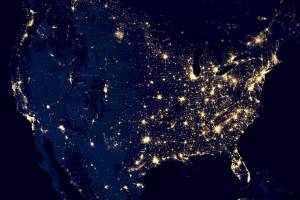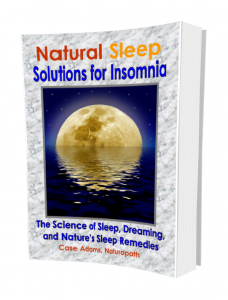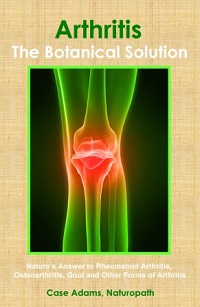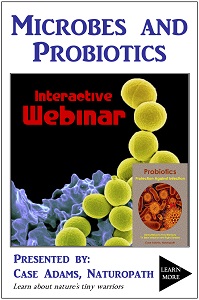Breast and Prostate Cancer Linked to City Lights

Nighttime city lights produce a lot of blue light. They also increase the risk of cancer according to scientists.
Breast cancer and prostate cancer risk is significantly increased by more exposure to more city lights at night according to scientists. This relates exposure to outdoor blue light from city lights to an increased risk of cancer.
Discover the connection.
City lights and blue light
Blue light is part of the spectrum of light that comes from the sun. This form of blue light is healthy for us during the day. These blue light wavelengths boost our cortisol levels and make us more awake and energized.
But during the night, blue light has a downside. Because blue light stimulates cortisol levels, it can negatively affect our ability to relax and sleep at night. Nighttime blue light during sleep hours can reduce our REM-stage sleep, which is critical to our brain function and our hormones.
This is why using a computer late at night can harm our sleep. And using a smartphone late at night can also harm our sleep. Night use of smartphones and using computers at night expose us to significant blue light wavelengths.
Typical light bulbs also produce significant blue light, but LED (light-emitting diodes) lights emit a significantly greater level of blue light wavelengths compared to conventional light bulbs.
This is why city lights expose us to a significant amount of blue light. City lights utilize a lot of LED because it shines brighter, attracting our attention more readily. LED lights also tend to utilize less power for their light emission, which can be a good thing when we consider power consumption.
As blue light enters our eyes, it stimulates our hippocampus and pineal gland. This in turn stimulates the production of cortisol and a reduction of melatonin. Because melatonin balances our body’s nighttime hormones, this produces an imbalance of our other hormone levels.
These hormone level imbalances, researchers have found, puts us at a greater risk of breast cancer and prostate cancer.
Research links nighttime blue light to cancer
A 2018 study from the Barcelona Institute for Global Health used data from 23 hospitals in 12 regions of Spain and studied more than 4,000 people. This study effectively included 1,218 cases of breast cancer and 623 prostate cancer cases. The researchers analyzed the behaviors of these patients along with 1,385 women control subjects and 879 male control subjects.
The researchers analyzed their lives with respect to their exposure of light during times that would be considered sleep time. They excluded subjects that worked at night so the study could offer a clear comparison between nighttime sleepers, which most of us are.
The researchers also utilized satellite data to include the exposure to city night lights. City light exposure also emits primarily blue light as discussed above.

Here is a satellite map of the U.S. at night. The bright lights are cities.
The researchers found that greater exposure to outdoor blue light during sleep time hours increased the risk of prostate cancer by more than double.
And those women with greater exposure to outdoor blue light at night had a 1.5 times increased incidence of breast cancer.
Prostate cancer was found to be particularly sensitive to blue light in general. Those men whose bedrooms contained more light had nearly three times (2.8) times the incidence of cancer compared to those with bedrooms that were dark.
How city lights increase cancer risk
For those who live in the countryside, we can readily understand how being in the city at night can change our hormone levels. Going to the city at night will expose our eyes to tremendous levels of very bright LED lights. These include street lights and blinking neon storefront signs. Most of us will immediately sense a feeling of heightened energy and alertness as we walk through a brightly-lit city at night.
As mentioned above, this alertness comes from the eyes and pineal gland being exposed to the intense blue wavelengths of the city lights at night. The exposure will boost our body’s levels of cortisol, increasing our energy levels.
But as stated above, the downside is that when cortisol is boosted, melatonin levels are reduced. This also has other effects upon other male hormones, imbalancing androgen levels.
This is confirmed by a 2018 study that found melatonin helps balance levels of testosterone and other androgens in the testes and prostate. The researchers stated:
“Melatonin acts as a local modulator of the endocrine activity in Leydig cells. In Sertoli cells, melatonin influences cellular proliferation and energy metabolism and, consequently, can regulate steroidogenesis.”
Melatonin also specifically helps block cancer cells from growing.
In a 2018 study from Italy’s Research University of Milano, medical scientists studied the effects of melatonin on breast cancer cells and prostate cancer cells. The researchers found that melatonin specifically inhibits the growth of cancer cells among both breast and prostate cells.
City lights and bright night light in general will reduce the body’s natural production of melatonin. And it is this form of natural melatonin – not necessarily synthetic melatonin – that helps our bodies prevent cancer from growing.
This research is also consistent with other studies that have found that night owls tend to die earlier and tend to have more inflammatory conditions.
This points to the reality that night lights in general increase our risk of cancer and affect our health negatively, related to getting a good night’s sleep. Good sleep habits naturally encourage healthy melatonin levels.

Discover more than 200 sleep remedies that will help increase natural melatonin levels and decrease the risk of prostate and breast cancer.
Scientific references
Garcia-Saenz A, Sánchez de Miguel A, Espinosa A, Valentin A, Aragonés N, Llorca J, Amiano P, Martín Sánchez V, Guevara M, Capelo R, Tardón A, Peiró-Perez R, Jiménez-Moleón JJ, Roca-Barceló A, Pérez-Gómez B, Dierssen-Sotos T, Fernández-Villa T, Moreno-Iribas C, Moreno V, García-Pérez J, Castaño-Vinyals G, Pollán M, Aubé M, Kogevinas M. Evaluating the Association between Artificial Light Exposure and Breast and Prostate Cancer Risk in Spain (MCC-Spain Study). Environ Health Perspect. 2018 Apr 23;126(4):047011. doi: 10.1289/EHP1837.
Calastretti A, Gatti G, Lucini V, Dugnani S, Canti G, Scaglione F, Bevilacqua A. Melatonin Analogue Antiproliferative and Cytotoxic Effects on Human Prostate Cancer Cells. Int J Mol Sci. 2018 May 18;19(5). pii: E1505. doi:10.3390/ijms19051505.
Yu K, Deng SL, Sun TC, Li YY, Liu YX. Melatonin Regulates the Synthesis of Steroid Hormones on Male Reproduction: A Review. Molecules. 2018 Feb 17;23(2). pii: E447. doi: 10.3390/molecules23020447.

















